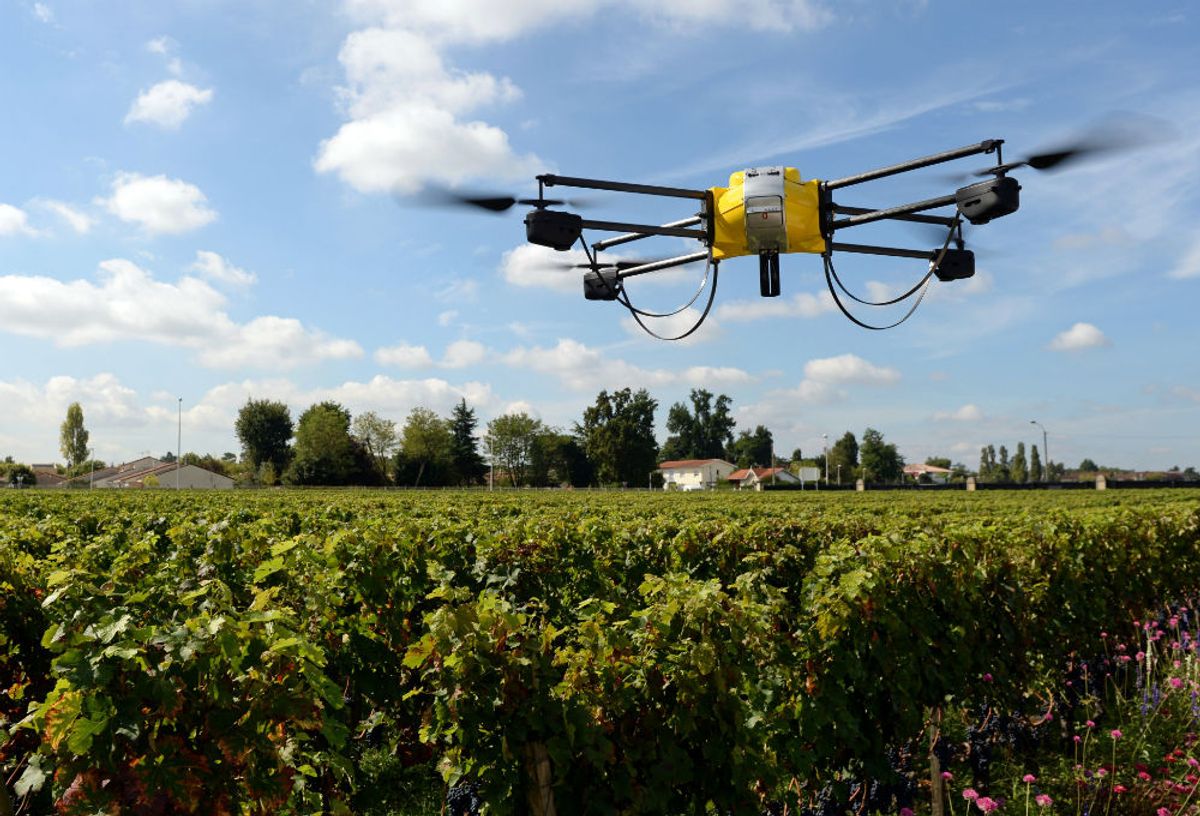The integration of Artificial Intelligence (AI) in agriculture is transforming the industry by enhancing efficiency, productivity, and sustainability. AI technologies, including machine learning, sensors, and robotics, are revolutionizing farming practices from crop management to customer support. This article explores the multifaceted impact of AI in optimizing farm management and customer support, outlining the advancements and future potential of this dynamic field.
Key Takeaways
- AI technologies in agriculture help optimize resource use, improve crop yields, and reduce environmental impact through precision agriculture and predictive analytics.
- Automation and AI-driven solutions in farm operations reduce labor costs, improve efficiency, and can mitigate the effects of labor shortages.
- AI enhances supply chain management by optimizing logistics, reducing waste, and improving traceability and food safety, thereby ensuring better market adaptability.
- Cloud-based AI platforms and AI as a Service (AIaaS) provide farmers with advanced, accessible tools for data-driven decision-making and increased productivity.
- AI is set to revolutionize customer support in agribusiness by offering personalized nutrition advice, quality control, and engaging educational resources.
Revolutionizing Crop Management with AI
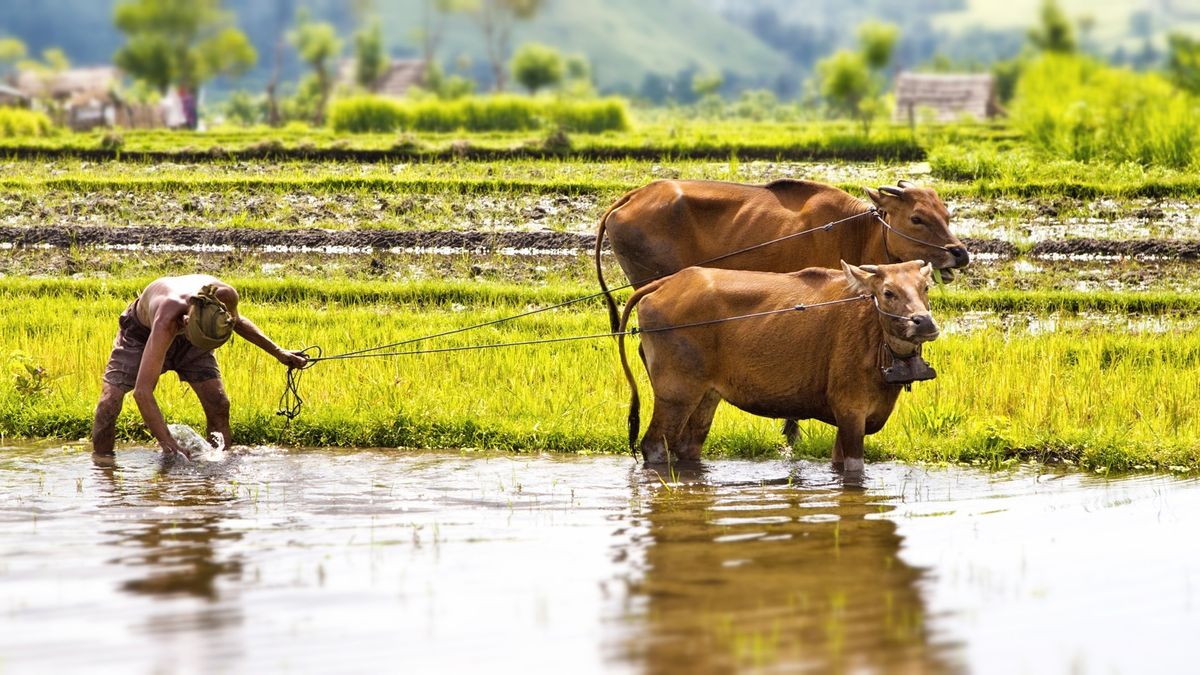
Precision Agriculture and Resource Optimization
The advent of AI in agriculture has led to a transformative approach in farm management, empowering farmers to optimize resource allocation and enhance crop yields while minimizing losses. By adopting precision agriculture methods, AI facilitates the precise application of inputs such as water, fertilizers, and pesticides, significantly reducing waste and lessening environmental impact.
- AI-driven predictive models forecast crop yields and market trends.
- Tailored fertilization schedules optimize nutrient application.
- Precision irrigation ensures efficient water distribution.
- Soil management identifies areas for targeted conservation practices.
AI's analytical capabilities extend to providing personalized guidance for crop management, adapted to specific soil conditions and weather patterns. This level of precision in agriculture not only bolsters efficiency but also supports sustainable farming practices.
The integration of AI in agriculture is not just about technological advancement; it's about fostering a sustainable and resilient food system for the future.
Predictive Analytics for Crop Yield and Health
Predictive analytics in agriculture harnesses the power of data to forecast crop yields and health, enabling farmers to make proactive decisions. By analyzing historical yield data, weather patterns, and soil health, AI algorithms provide precise yield forecasts. This not only aids in planning but also enhances risk management for agricultural businesses.
- Yield Prediction: Estimating crop yields to optimize harvests.
- Crop Quality Assessment: Ensuring marketability through sensors and machine learning.
- Disease Detection: Prompt identification and treatment using image recognition.
- Weed Detection: Employing computer vision for efficient weed control.
Predictive analytics transforms the approach to farming, from reactive to proactive, by anticipating and addressing potential issues before they escalate. This shift is crucial for maintaining high standards of crop quality and yield.
The integration of machine learning and computer vision technologies into predictive analytics allows for automated analysis and tailored treatments for crops. Satellite imagery and predictive models are instrumental in evaluating crop health and forecasting yields, which are vital for strategic planning and marketing.
AI-Driven Pest and Disease Management
The integration of artificial intelligence (AI) in pest and disease management is transforming the agricultural landscape. AI technologies enable farmers to detect and classify plant diseases in real-time, leading to more effective and timely interventions. By analyzing data from sensors and drones, AI algorithms can identify infestations and predict outbreaks before they become widespread, allowing for targeted treatments that preserve crop health and yield.
AI-driven systems also support sustainable farming practices. For instance, they facilitate manual weed removal and reduce the reliance on synthetic herbicides, aligning with organic farming principles. This approach not only optimizes resource use but also minimizes environmental impacts.
AI's role in agriculture extends beyond immediate pest control. It contributes to long-term sustainability by enabling precise soil management and conservation practices.
The table below summarizes the benefits of AI in pest and disease management:
Enhancing Farm Operations Through Automation
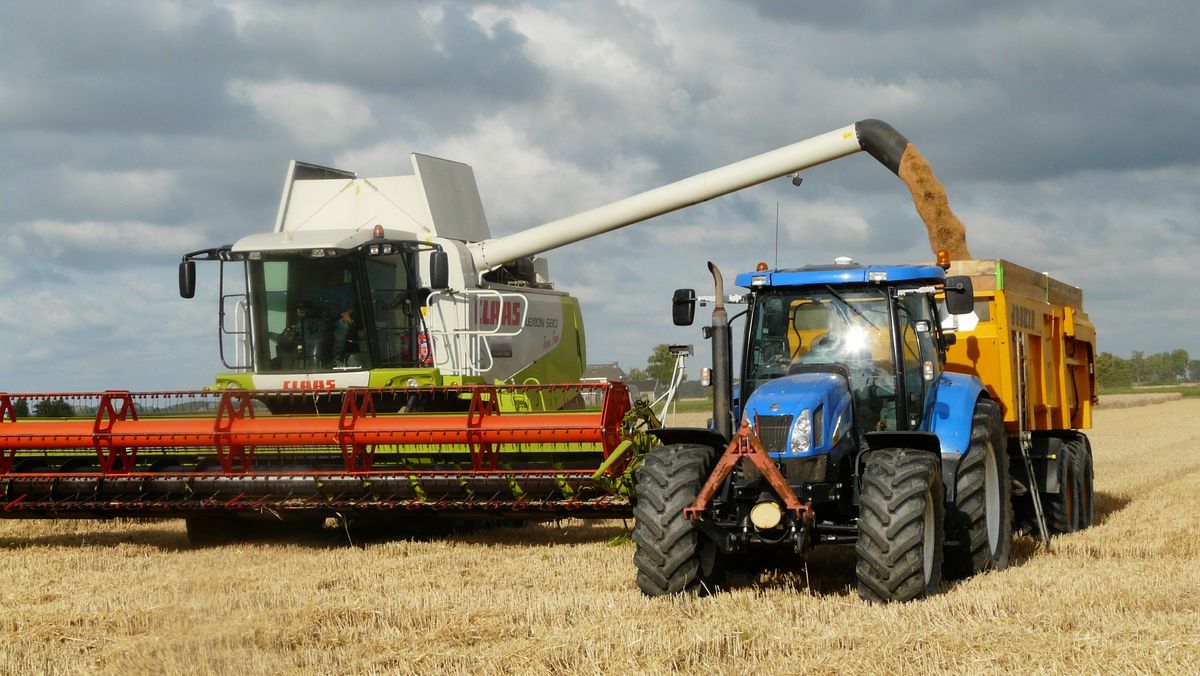
Robotics and Autonomous Farm Equipment
The advent of robotics and autonomous farm equipment is a game-changer in the agricultural sector, offering unprecedented levels of efficiency and precision. Autonomous tractors and robotic harvesters are now capable of performing tasks with minimal human intervention, revolutionizing the way crops are cultivated and managed.
- Autonomous agriculture robots and equipment tackle agronomic challenges head-on, enhancing productivity and sustainability.
- The integration of AI with autonomous systems allows for real-time data analysis, enabling precise operations and decision-making.
- Government investments, like the
With the support of AI and big data, autonomous farming equipment can now operate with the intuition of a seasoned farmer, making informed decisions that optimize farm management.
The implementation of these technologies not only makes farming safer but also reduces labor costs and dependency. As we embrace this leap forward in Ag-Tech, it's clear that the future of farming lies in the synergy between AI and automation.
AI in Irrigation and Fertilization Systems
The integration of AI in irrigation and fertilization systems is transforming the agricultural landscape. By leveraging data from sensors and drones, AI algorithms enable precise targeting of areas in need of water and nutrients, significantly reducing resource wastage and environmental impact.
- Water Management: AI-driven systems predict water demand and optimize distribution, ensuring efficient use of resources. Smart irrigation systems, for instance, adjust watering schedules based on real-time soil moisture levels and crop requirements, leading to substantial water conservation.
- Fertilization Optimization: AI helps create precise fertilization schedules, minimizing nutrient waste. It also identifies areas at risk of erosion or nutrient depletion, allowing for targeted interventions.
AI technologies in agriculture are not just about efficiency; they also contribute to environmental sustainability by aiding in soil carbon sequestration and improving water quality.
The role of AI extends beyond just automation; it encompasses the careful analysis and application of data to make informed decisions that benefit both the farm and the environment.
Labor Management and Cost Reduction Strategies
In the agricultural sector, managing labor costs while maintaining a skilled workforce is paramount. AI-driven tools are now pivotal in achieving this balance. They assist in scheduling, monitoring, and optimizing workforce deployment, leading to more efficient farm operations.
- Workforce Analytics: AI systems analyze worker performance and predict labor needs, ensuring optimal staffing levels.
- Automated Task Allocation: Tasks are assigned based on skillsets and availability, reducing downtime and increasing productivity.
- Training and Upskilling: AI-driven simulations and tutorials help in continuous skill development of the workforce.
By integrating AI into labor management, farms can significantly reduce operational costs and enhance productivity.
The use of AI in agriculture extends beyond mere automation; it is about augmenting human capabilities and making farming safer. With the government's commitment to Agritech, the industry is poised for transformative growth, leveraging AI to maximize production and reduce labor costs.
AI-Powered Supply Chain and Market Predictions
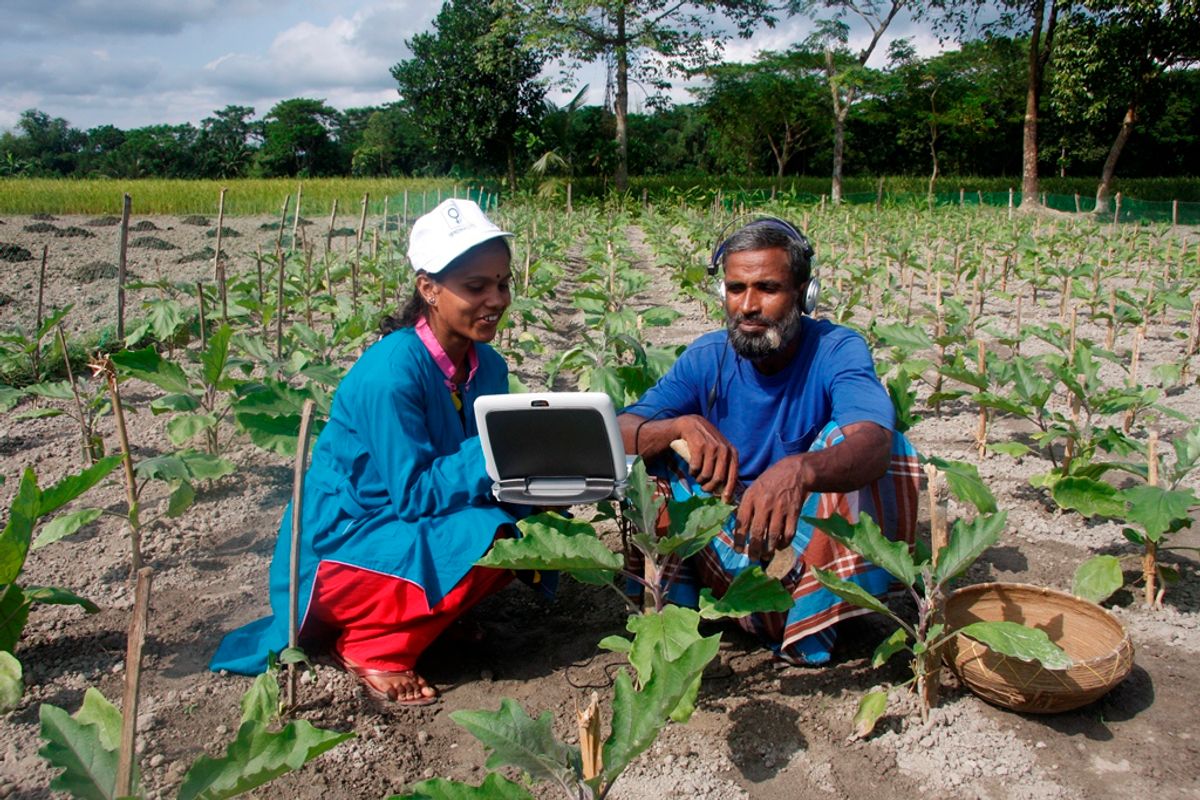
Optimizing Logistics and Reducing Waste
The integration of AI in agricultural logistics is transforming the supply chain, making it more efficient and sustainable. By leveraging AI, farmers and distributors can predict the best routes for transportation, reducing fuel consumption and delivery times. This not only minimizes the carbon footprint but also ensures that produce reaches the market in peak condition, reducing waste significantly.
- AI-driven route optimization reduces fuel consumption and emissions.
- Real-time tracking minimizes delays and improves delivery efficiency.
- Predictive analytics forecast demand, preventing overproduction and surplus.
Blockchain technology, as implemented by companies like Trimble Transportation Enterprise Solutions, is enhancing transparency and accountability in the supply chain. This shift from manual systems to blockchain-based applications is crucial for real-time data access and decision-making.
By adopting AI and blockchain, the agricultural sector is paving the way for a more accountable and waste-free future.
Traceability and Food Safety Improvements
The integration of AI in the agricultural supply chain has marked a significant leap in ensuring food safety and traceability. By leveraging blockchain technology, the industry has seen a transformation in how food products are tracked from farm to table. This technology not only secures transactions but also provides a transparent record of the product's journey, enhancing consumer trust.
Blockchain applications, such as Hyperledger Fabric and Corda, offer robust platforms for ensuring product quality and provenance. These systems allow for the tracking of critical points in the supply chain, which is essential for identifying and managing food safety risks. The use of AI for food safety surveillance and hazardous source tracking purposes enables the identification of critical points and processes that are susceptible to contamination or other safety issues.
AI and blockchain are converging to make farming safer and more reliable. This convergence is paving the way for a future where farmers can manage inputs more precisely and utilize automation to reduce labor costs, all while maintaining high standards of food safety.
The table below summarizes the benefits of AI and blockchain in agriculture:
Forecasting Market Trends and Demand
The integration of AI in agriculture extends beyond the fields and into the complex world of market dynamics. Predictive analytics, powered by AI, is transforming how farmers and distributors anticipate market demand and trends. By analyzing historical and real-time data, AI systems can forecast future events, enabling stakeholders to make informed decisions that enhance profitability and sustainability.
- Market Size: Expected to reach USD 6.96 billion by 2030
- CAGR: Projected at 22.3% from 2022 to 2030
- Dominating Region: North America
AI's predictive tools are not just about data analysis; they represent a shift towards proactive risk mitigation and opportunity maximization in the agricultural sector.
The adoption of technologies such as machine learning and computer vision has led to the development of sophisticated prediction models. These models serve as automated forecasting tools for business-critical processes, helping growers and distributors navigate the unpredictability of weather and global economic influences.
AI Integration in Farm Management Platforms
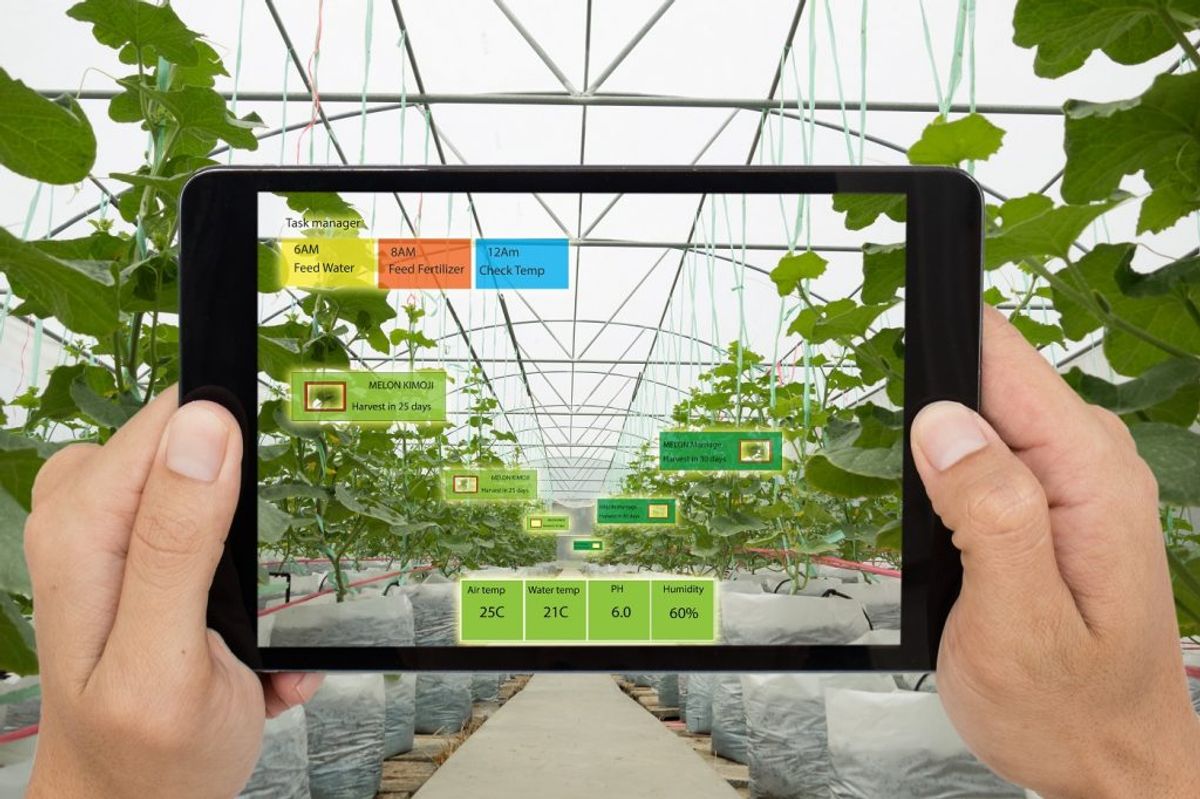
Cloud-Based AI Solutions for Farmers
The advent of cloud-based AI solutions is a game-changer for the agricultural sector. These platforms provide farmers with access to cutting-edge AI technologies without the need for heavy infrastructure investments. By integrating AI with IoT devices and Big Data analytics, real-time monitoring and decision-making become not only possible but also scalable, catering to farms of all sizes.
AI-driven recommendations for crop and soil management are at the heart of these solutions, leading to enhanced productivity and greater sustainability. The ability to optimize agricultural supply chains is another significant advantage, improving logistics, reducing waste, and ensuring product traceability.
AI promotes sustainability by optimizing resource use and minimizing environmental impact in farming practices.
AIaaS takes a specialized approach, offering subscription-based services that provide AI-powered algorithms, models, and tools. This enables farmers to integrate advanced AI capabilities into their existing systems seamlessly, without the need for extensive expertise or infrastructure.
Data-Driven Decision Making and Productivity
In the realm of agriculture, data-driven decision making is transforming the way farmers manage their crops and resources. With the advent of AI, farmers now have access to a wealth of data points that can be analyzed within seconds, leading to more informed decisions and enhanced productivity. AI solutions in agriculture significantly impact the Total Factor Productivity (TFP) by optimizing production practices and streamlining processes such as precision agriculture and crop monitoring.
The integration of AI tools like ChatGPT and other generative AI technologies has been shown to substantially raise productivity. These tools assist in predicting crop yields and analyzing employee characteristics, which in turn contributes to a more efficient and productive agricultural sector. The use of AI-based digital assistants also positively impacts job engagement, further driving the sector's growth.
Embracing AI in agriculture goes beyond mere technology adoption; it's about fostering data literacy among farmers. Increasing understanding and utilization of AI will drive more evidence-based decision-making, crucial for addressing global challenges like food and water security.
AI as a Service (AIaaS) for Specialized Capabilities
AI as a Service (AIaaS) takes a more specialized approach, providing farmers with access to cutting-edge AI technologies on a subscription basis. These services enable the seamless integration of AI-powered algorithms, models, and tools into existing farm systems or applications, eliminating the need for extensive in-house expertise or infrastructure.
AIaaS offerings are diverse, ranging from machine learning models for crop disease detection to computer vision algorithms for pest monitoring and predictive analytics tools for yield forecasting. Here's a glimpse of what AIaaS can provide:
- Machine learning models for crop disease detection
- Computer vision algorithms for pest monitoring
- Predictive analytics for yield forecasting
By subscribing to AIaaS, farmers can leverage specialized AI capabilities to enhance decision-making and productivity. This is particularly beneficial for addressing the complex challenges of food security, sustainability, and profitability in modern agriculture.
The Future of Customer Support in Agribusiness
Personalized Nutrition and Consumer Engagement
The intersection of AI and personalized nutrition is transforming the way consumers engage with their food. By analyzing individual dietary needs and preferences, AI enables the creation of tailored nutrition plans that promote well-being and a healthy life. This not only fosters a closer connection between consumers and their diets but also opens up new avenues for agribusinesses to meet specific market demands.
In the realm of consumer engagement, AI tools are instrumental in providing insights that help businesses understand and predict consumer behavior. This leads to more effective marketing strategies and product development that resonate with consumer needs. For instance, AI can analyze social media trends to determine which health foods are gaining popularity, allowing companies to adjust their offerings accordingly.
The synergy between AI and personalized nutrition is a testament to the potential of technology in enhancing the quality of life and revolutionizing consumer experiences in the agricultural sector.
The table below illustrates the impact of AI on key aspects of personalized nutrition and consumer engagement:
Quality Control and Food Processing Innovations
The integration of AI in food processing and quality control is a transformative force in agribusiness. AI technologies optimize resources and increase productivity, crucial in today's challenging supply chain and climate conditions. Machine learning, IoT, and computer vision are just a few of the tools reshaping how we approach food safety and personalized nutrition.
AI's role extends beyond mere automation, influencing a diverse range of applications from energy management to novel crop development. The precision and efficiency brought by these technologies ensure high-quality produce and innovative solutions for the sector.
The advancements in AI not only revolutionize crop management but also enhance food processing techniques. Here's how AI contributes to quality control in food processing:
- Utilizing machine learning algorithms to detect and sort defective products.
- Implementing IoT sensors for real-time monitoring of food safety parameters.
- Employing computer vision systems to ensure consistent product quality.
- Leveraging big data analytics for traceability and compliance with food safety standards.
Educational Resources and AI-Enhanced Communication
The integration of AI into agricultural education and communication channels is creating a paradigm shift in how knowledge is disseminated and consumed. AI-driven platforms are enhancing the learning experience by providing personalized content and interactive tools that cater to the diverse needs of learners.
For instance, AI can analyze user interactions and performance to recommend tailored educational materials, ensuring that each individual's learning path is optimized for efficiency and retention. This approach not only streamlines the educational process but also makes it more engaging and effective.
The careful integration of technology into vocabulary teaching tools can contribute to enhancing student learning outcomes.
Moreover, AI-enhanced communication systems are revolutionizing customer support in agribusiness. They enable real-time, accurate, and context-aware responses to inquiries, which is critical for maintaining trust and satisfaction among consumers. By leveraging natural language processing and machine learning, these systems can provide instant support and guidance, reducing the need for extensive human intervention.
To ensure the successful adoption of these technologies, it is crucial to provide comprehensive training programs for farmers and agricultural workers. Such programs should focus on the skills needed to effectively operate and manage AI technologies, interpret data insights, and address technical challenges.
Conclusion
The integration of Artificial Intelligence (AI) into agriculture is a transformative force, reshaping the landscape of farm management and customer support. AI's advanced algorithms and machine learning techniques have proven to be instrumental in enhancing efficiency, productivity, and sustainability across various agricultural practices. From precision agriculture to predictive analytics, AI-driven solutions are empowering farmers with data-driven insights, enabling them to optimize resource allocation, reduce waste, and make informed decisions. The potential of AI to revolutionize food production, improve food safety, and address global challenges such as food security and climate change is immense. As the agricultural sector continues to adopt these innovative technologies, AI stands as a pivotal tool for ensuring a more prosperous and sustainable future for farming worldwide.
Frequently Asked Questions
How does AI contribute to crop management in agriculture?
AI contributes to crop management by enabling precision agriculture, which allows for accurate monitoring and management of crops. It uses data from sensors and drones to optimize resource utilization, predict yields and health, and manage pests and diseases efficiently.
What are the benefits of integrating AI in farm operations?
Integrating AI in farm operations leads to automation of tasks such as irrigation and fertilization, use of autonomous farm equipment, and improved labor management. This results in increased productivity, reduced labor costs, and enhanced sustainability of farming practices.
In what ways does AI impact the agricultural supply chain?
AI optimizes the agricultural supply chain by improving logistics, reducing waste through better demand forecasting, and enhancing product traceability and food safety. This leads to a more efficient and transparent supply chain from farm to consumers.
How do cloud-based AI solutions benefit farmers?
Cloud-based AI solutions provide farmers with access to advanced analytics and decision-making tools without requiring significant infrastructure investment. These platforms enable data-driven decision making, improving productivity and crop management on a large scale.
What role does AI play in agribusiness customer support?
AI plays a crucial role in enhancing customer support in agribusiness by providing personalized nutrition advice, engaging consumers through educational resources, and improving quality control in food processing with AI-enhanced communication and support systems.
Can AI in agriculture help address global challenges such as food security?
Yes, AI in agriculture has the potential to significantly address global challenges like food security by increasing crop yields, optimizing resource allocation, and enabling precision agriculture. This can lead to more sustainable food production and reduced hunger worldwide.

